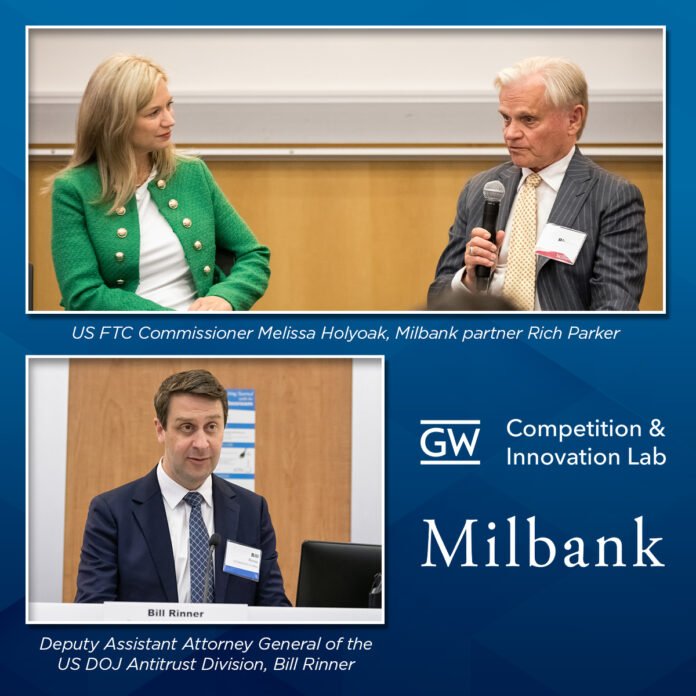Milbank LLP’s Global Antitrust Group and the George Washington University Competition & Innovation Lab co-hosted their second antitrust conference on Wednesday, June 4, 2025. The event was headlined by remarks from Melissa Holyoak, US FTC Commissioner, and Olivier Guersent, Director-General for Competition at the European Commission.
Milbank partner Rich Parker interviewed Mr. Guersent and Commissioner Holyoak. Commissioner Holyoak explained her view that the agencies should take note of the courts’ recent rulings, such as UnitedHealth/Change Healthcare and Illumina/Grail, in which the courts noted that a remedy offered by the parties should factor into whether the merger is “likely to substantially lessen competition,” and therefore violates the Clayton Act.
Milbank partners Alexander Rinne, Fiona Schaeffer, James Weingarten, Adam Di Vincenzo, Andrea Hamilton and Grant Bermann hosted panels on US merger and antitrust enforcement, and international competition enforcement. Throughout the day, panelists and attendees discussed the implications of recent changes in political leadership, trade policy and international relations on antitrust enforcement in the US, EU and more broadly internationally. Panels were moderated by Milbank antitrust partners, and speakers included in-house counsel, government enforcers and other leading experts.
To conclude the conference, Mr. Di Vincenzo introduced Bill Rinner, Deputy Assistant Attorney General of the US DOJ Antitrust Division. Mr. Rinner’s speech included important merger enforcement policy announcements, including guidance on what the DOJ under Trump 2.0 will expect from merging parties, and new processes to ensure “robust enforcement” that is “fair and predictable” for businesses. In particular, he emphasized a renewed focus on procedural due process. He also discussed:
- DOJ’s plan to “strive for a predictable [merger review] process that provides a fair opportunity [for parties’] to engage and be heard.”
- How DOJ will, during the merger review process, have a renewed focus “on identifying competitive concerns, addressing them with the parties, and reaching a swift determination on whether enforcement is needed.”
- That DOJ will not send “warning letters” to merging parties who have cleared HSR, a practice under the Biden Administration where the agencies would notify the parties that they closed their transaction at their own risk (i.e., that the agencies could seek enforcement post-clearance).
- How DOJ, when deciding on whether to launch an in-depth investigation, will not issue “spurious second requests” to investigate matters that are unrelated to competitive effects of the merger under review. Mr. Rinner commented “As AAG Slater has said, antitrust is a scalpel that stands in contrast to the regulatory sledgehammer. On the merger side, our focus is on keeping the scalpel sharp. This allows us to surgically remove unlawful transactions (or their unlawful aspects) without nicking neutral deals or wounding procompetitive ones.”
- How DOJ will not negotiate remedies “off-the-books” in a manner that is “beyond the specific harm to competition that a merger creates.”
- That DOJ under Trump 2.0 will favor publishing remedies through the Tunney Act process (i.e., consent decrees), which will afford a public process and court review (indeed, DOJ announced the first Tunney Act consent decree in nearly five years just last week).
- That structural relief (i.e., divestitures) will continue to be DOJ’s preferred form of merger remedy, but noted DOJ might be open to accepting “limited behavioral remedies that buttress” structural relief.
Mr. Rinner’s speech is available in its entirety on the DOJ website.
[ad_1]
Source link

